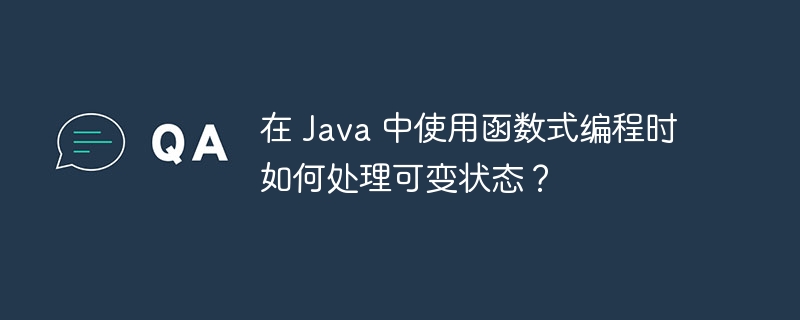在 Java 中使用函数式编程时如何处理可变状态?(可变.如何处理.函数.状态.编程...)
在 java 中使用函数式编程处理可变状态时,可采用以下方法:使用不可变集合,防止集合本身被修改;创建新的不可变对象,包含修改后的值,并返回新对象;使用同步,防止多线程访问时产生数据竞争。实战案例中,对于求和偶数的函数,可变状态解决方案为遍历列表并累加偶数;不可变状态解决方案为使用流 api 筛选和累加偶数。

在 Java 中使用函数式编程处理可变状态
在面向对象编程中,对象的状态是可变的,这意味着对象的值可以在其生命周期内发生变化。然而,在函数式编程中,状态应该是不可变的,以确保函数的纯洁性。
当在 Java 中使用函数式编程时,处理可变状态是一个常见的问题。下面介绍几种方法:
1. 使用不可变集合:
使用不可变集合(如 List.of()、Set.of())可以防止集合本身被修改。尽管集合中的元素可能仍然是可变的,但这可以防止意外修改集合。
例如:
import java.util.List;
public class Example1 {
public static void main(String[] args) {
List<String> names = List.of("John", "Jane", "Bob");
names.add("Alice"); // 编译错误:不可变列表
}
} 2. 使用不可变对象:
创建一个新的不可变对象,该对象包含修改后的值,并返回该新对象。这将保持原始对象的不可变性。
例如:
public class Example2 {
private int counter;
public Example2(int counter) {
this.counter = counter;
}
public int getCounter() {
return counter;
}
public Example2 withIncreasedCounter() {
return new Example2(counter + 1);
}
public static void main(String[] args) {
Example2 example = new Example2(0);
Example2 updatedExample = example.withIncreasedCounter();
System.out.println(example.getCounter()); // 仍为 0
System.out.println(updatedExample.getCounter()); // 1
}
} 3. 使用同步:
当多个线程同时访问同一个可变对象时,可以使用同步来防止数据竞争。
例如:
public class Example3 {
private int counter;
public synchronized int getCounter() {
return counter;
}
public synchronized void increaseCounter() {
counter++;
}
public static void main(String[] args) {
Example3 example = new Example3();
Thread thread1 = new Thread() {
@Override
public void run() {
for (int i = 0; i < 100000; i++) {
example.increaseCounter();
}
}
};
Thread thread2 = new Thread() {
@Override
public void run() {
for (int i = 0; i < 100000; i++) {
example.increaseCounter();
}
}
};
thread1.start();
thread2.start();
try {
thread1.join();
thread2.join();
} catch (InterruptedException e) {
e.printStackTrace();
}
System.out.println(example.getCounter()); // 200000
}
} 实战案例:
假设我们有一个函数 sumEvenNumbers(List
可变状态解决方案:
public class Example4 {
public static int sumEvenNumbers(List<Integer> numbers) {
int sum = 0;
for (Integer number : numbers) {
if (number % 2 == 0) {
sum += number;
}
}
return sum;
}
public static void main(String[] args) {
List<Integer> numbers = Arrays.asList(1, 2, 3, 4, 5, 6);
int result = sumEvenNumbers(numbers);
System.out.println(result); // 12
}
} 不可变状态解决方案:
public class Example5 {
public static int sumEvenNumbers(List<Integer> numbers) {
return numbers.stream()
.filter(number -> number % 2 == 0)
.reduce(0, Integer::sum);
}
public static void main(String[] args) {
List<Integer> numbers = Arrays.asList(1, 2, 3, 4, 5, 6);
int result = sumEvenNumbers(numbers);
System.out.println(result); // 12
}
} 以上就是在 Java 中使用函数式编程时如何处理可变状态?的详细内容,更多请关注知识资源分享宝库其它相关文章!
